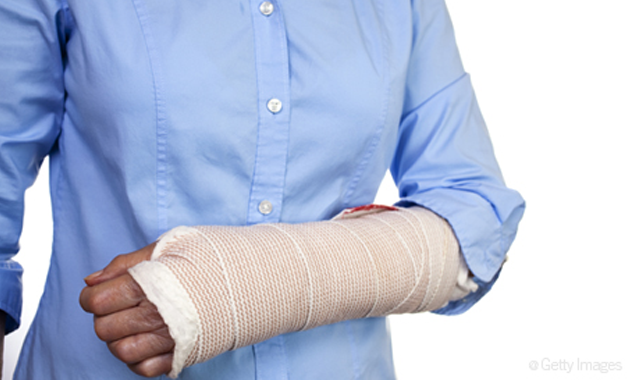The top things dental hygienists need to know about mandatory disability
Take a moment to ask yourself, do you really need disability insurance? If you think not, unfortunately you’d be wrong.

Do you really need disability insurance? If you think not, unfortunately you’d be wrong.
Every dental hygienist should be in charge of their own future, so make sure you are aware of what it will cost to maintain yours, due to a possible short- or long-term medical emergency. Most private dental offices won’t offer the benefit of disability insurance, and you may need it at some point in your career. So though it may not be mandatory to them, it should be to you.
Temping as a hygienist, I have been in many offices throughout my career, hired due to current hygienists being sick or injured on the job. For some, temp jobs are only short term, but for others they are careers, and can also be career changing. For instance, I was temping at an office that had a hygienist who had worked there for over 10 years of her 33-year career and was suffering from carpal tunnel syndrome. Looking over the instruments at the office, I soon noticed why. Most of the instruments were dull and there was no Cavitron in sight. After temping there for three weeks I knew she was not coming back, and even though I was offered her job, I didn’t take it, for fear that the same situation would befall me. During the entire time all I could think was that the dull instruments and lack of a Cavitron had ultimately led to her body fatiguing.
Trending article: 5 reasons being a dental hygienist is harder than you may think
Many hygienists are working in offices that have dilapidated chairs with little or no lumbar support, (back pain due to poor posture or chair positioning is the second-highest work injury hygienists suffer from), worn instruments, and lack of key equipment used to make cleanings far more thorough and efficient.
The state of the equipment also does not depend on the location or production of an office, because there are just as many offices in affluent areas with poor equipment. How can you do a proper cleaning when you don’t have the right equipment? That’s like asking a wood carver to carve a masterpiece, without proper tools, and dull ones at that, it can’t be done!
All of these factors can be debilitating and add up to negatively affect your career in the long run.
Fortunately, taking certain measures can prevent work-related injuries. As you enter an office, assess the state of the instruments and equipment you will be using. By adjusting both your chair and the patient’s chair to a position that will allow you to work comfortably, and practicing good posture and hand-eye coordination, you can increase the longevity of your extraordinary dental career.
Sometimes though, life just happens; due to a vacation accident, difficult pregnancy or debilitating illness that you could have never foreseen. Your recovery period could be anywhere from a few months up to a year, before you’re able to return to the profession you love so much.
Trending article: Why educating the entire team in oral cancer detection protocol is critical
Hypothetically, if diagnosed with an injury or illness, what would be your thoughts if while brushing your own teeth, you saw blood in your bathroom sink? Or you weren’t able to floss your own teeth, due to a hand injury, causing limited dexterity? You have now become the patient that you had worked so hard to care for. The thought of that should send a fervent plea to your soul, of how unpredictable life can be.
If unfortunately you were put into a position where you were looking at the possible end of your career due to injury or illness, how would you make sure that you were being cared for financially? Remember no one can take better care of you than you. This is where the subject of disability insurance comes into play.
Some of the larger dental companies may offer a disability plan as part of your hiring benefits, but in the case of most independent dental offices, you are mostly on your own. As a result I would advise you to sign your own disability policy, and get a copy of the paperwork afterwards. It is really simple to get started and never too early to start one. Your premium will be based on your age, current health and period of coverage; there are plenty of great plans out there that want to make sure you are covered at a low monthly cost. So take the time before it’s too late, because most insurance companies won’t cover pre-existing injury. Your overall health should be important to you first, and not sacrificed for bonus plans or production.
How Dentists Can Help Patients Navigate Unforeseen Dental Care
December 12th 2024Practices must equip patients with treatment information and discuss potential financing options before unexpected dental treatments become too big of an obstacle and to help them avoid the risk of more costly and invasive procedures in the future.
Product Bites – January 12, 2024
January 12th 2024The weekly new products podcast from Dental Products Report is back. With a quick look at all of the newest dental product launches, Product Bites makes sure you don't miss the next innovation for your practice. This week's Product Bites podcast features new launches from Videa Health and DentalXChange.
Product Bites – October 27, 2023
October 27th 2023Product Bites makes sure you don't miss the next innovation for your practice. This week's Product Bites podcast features new launches from Kerr Dental, MGF, PreXion, ZimVie, Amann Girrbach, VOCO, ASI Dental Specialties, DMG, and NovoDynamics. [8 Minutes]